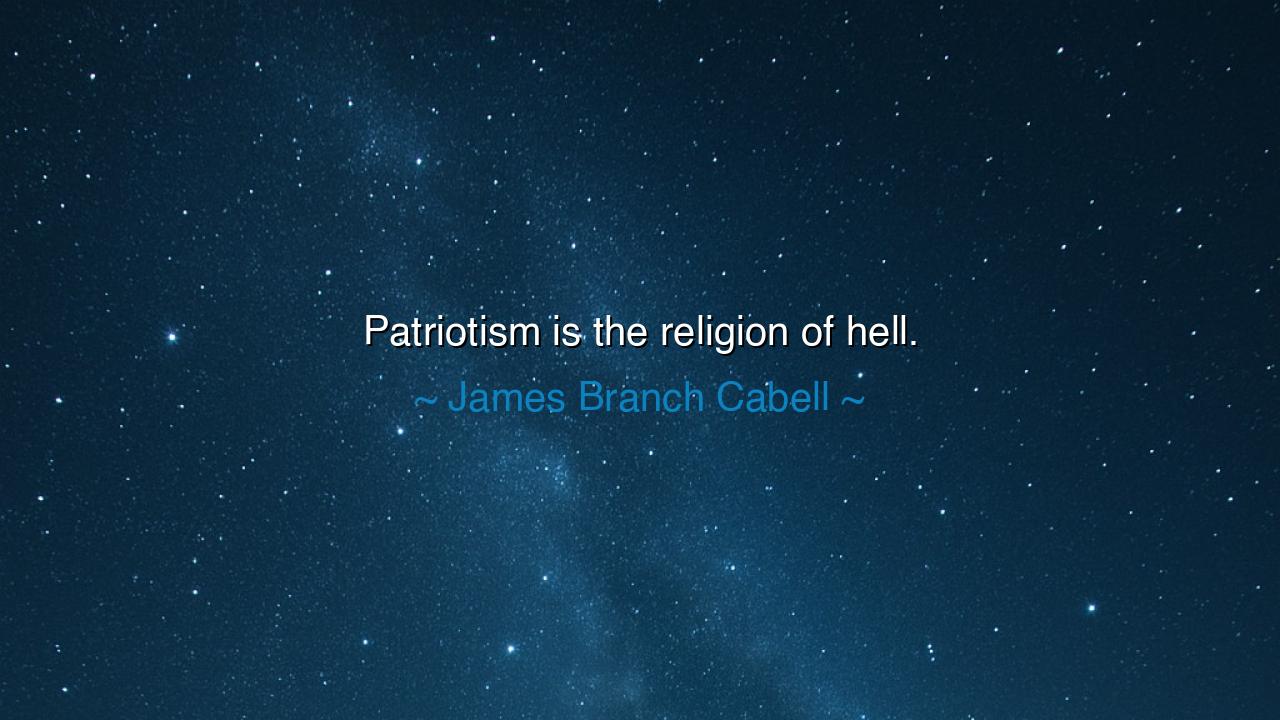
Patriotism is the religion of hell.






In the turbulent course of human history, the concept of patriotism has often been wielded as a powerful force, uniting people to stand together for the greater good of their nations. However, in the piercing words of James Branch Cabell, "Patriotism is the religion of hell," we are called to confront the darker, more dangerous sides of this force. Patriotism, when raised to the level of religion, can blind us to the greater ideals of truth, justice, and compassion. By aligning our identity so closely with the nation, Cabell suggests, we may be driven to acts of blind loyalty, violence, and injustice, much like the fervent zeal of religious extremism. It is a dangerous path, where the love for one's country can turn into a tool of hatred and division, leading us to make choices that have devastating consequences, both for ourselves and for the world.
The ancients often warned of the dangers of excessive loyalty to the state, recognizing that patriotism, while a powerful force for unity, could also lead to hubris and self-destruction. In the Iliad, Homer presents the story of Achilles, a hero whose patriotism to the Greek cause leads him to sacrifice both his personal honor and his life. Achilles, though revered as a hero, is ultimately undone by his pride in his role as a defender of his people. His fury and his fidelity to the cause, untempered by reason, drive him into a cycle of vengeance and destruction. His story is a cautionary tale of what can happen when patriotism becomes an all-consuming force, overriding personal morality and the common good.
Socrates, too, in his defense during his trial in Athens, spoke to the danger of blind loyalty to the state. He was accused of corrupting the youth and disrespecting the gods, charges which, if taken in a purely patriotic sense, could have led to his execution. Yet, Socrates made a poignant distinction between the obedience to just laws and the blind loyalty to a government that might be wrong. He famously argued that moral responsibility transcends patriotism, and that the duty of an individual is to seek justice above all else. In this way, the ancients suggested that true patriotism should align with the pursuit of truth, reason, and the greater good, not blind allegiance to flawed or corrupt systems.
The consequences of unchecked patriotism are starkly evident throughout history. The World Wars, for instance, demonstrated how national pride and blind allegiance to one’s country could fuel devastating conflicts. Adolf Hitler, a figure whose patriotism became twisted into nationalism and supremacy, led Germany and the world to a catastrophic war, resulting in the deaths of millions. His patriotism was not the love of his people, but an obsession with power, control, and domination, which led to the horrors of the Holocaust. Cabell’s words ring especially true in this context: when patriotism becomes a religion, it ceases to be an expression of love and becomes a weapon for destruction.
In more recent times, the rhetoric of patriotism has often been used to justify actions that contradict the values of compassion and justice. The Vietnam War and the Iraq War are modern examples where the flag of patriotism was carried high, but the human cost was immense, and the moral justification for these wars remains questionable. Leaders invoked the ideal of defending freedom and democracy, yet the actions taken often contradicted those very principles, causing harm to both soldiers and civilians alike. Patriotism, when used as a shield for war and violence, can blind individuals to the real consequences of their actions, leading them into a hellish spiral of conflict, suffering, and regret.
The lesson here is one of reflection and balance. Patriotism, like any form of loyalty or devotion, is a double-edged sword. It can be a powerful force for good, uniting people toward common causes of justice and prosperity. But when it transcends rationality, when it becomes a blind allegiance that leads us to justify acts of violence or oppression, it becomes dangerous. Cabell calls us to question whether our devotion to our country or group identity has become too entrenched in emotion and pride, leading us away from the universal values of humanity, peace, and justice.
Thus, the practical action we must take is to hold space for both patriotism and reason. Let us love our countries, but not at the cost of justice and human dignity. Let us ask difficult questions about the true motives behind our allegiance, and whether it aligns with the values we hold most dear. True patriotism should inspire courage to defend what is right, but not to commit injustice in the name of national pride. By embracing patriotism as a force for unity and humanity, rather than as a tool of division and violence, we can avoid the hellish consequences Cabell warns of. Let us honor our countries, but let us also honor humanity above all—this is the path to true peace and progress.






AAdministratorAdministrator
Welcome, honored guests. Please leave a comment, we will respond soon